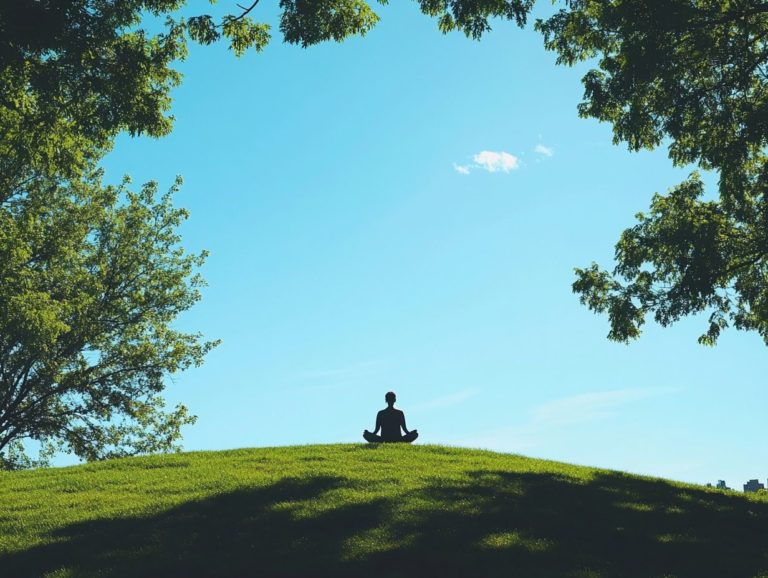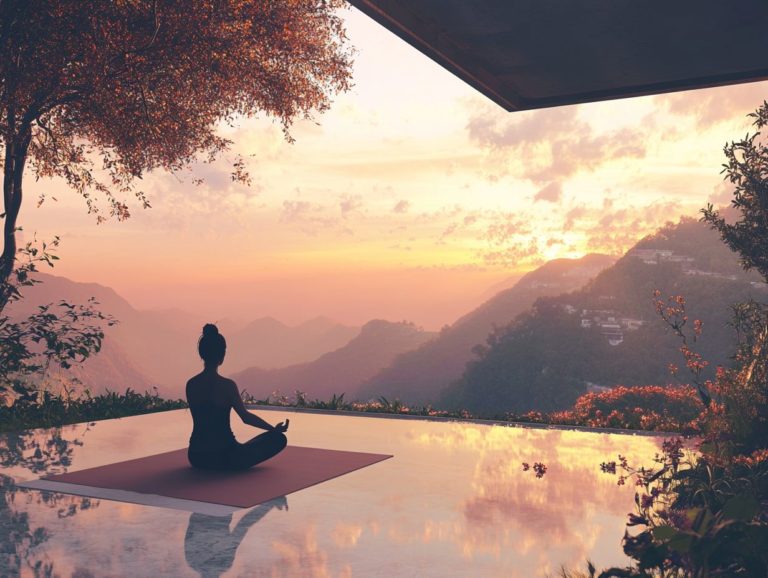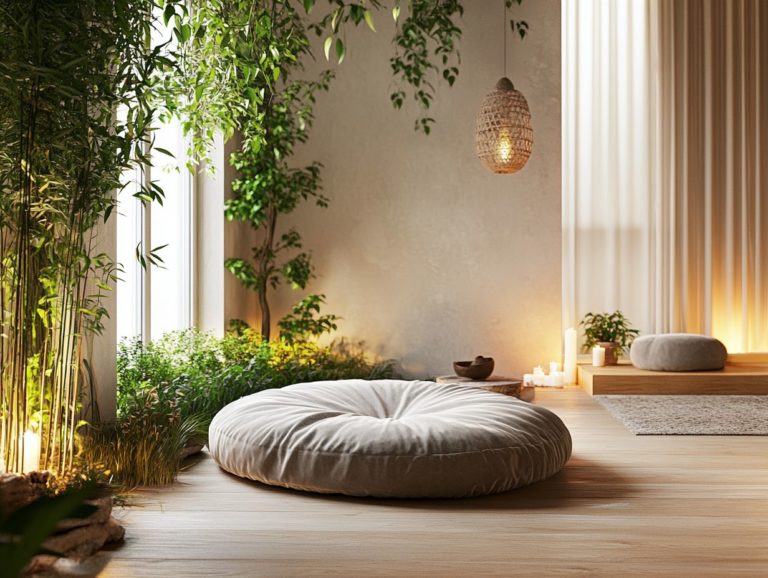5 Effective Mind-Body Techniques for Better Sleep
Struggling to enjoy a good night’s sleep? You re certainly not alone. Many people toss and turn, searching for effective ways to get restful slumber.
In this article, you’ll learn five powerful mind-body techniques to enhance your nightly routine. From progressive muscle relaxation to yoga, these practices soothe your mind and ready your body for restorative rest.
Discover the benefits, optimal times for practice, and tips for incorporating these techniques into your evening ritual. Say goodbye to restless nights!
Contents
- Key Takeaways:
- 1. Progressive Muscle Relaxation
- 2. Deep Breathing Exercises
- 3. Guided Imagery
- 4. Mindful Meditation
- 5. Yoga para un Mejor Sue o
- How Do Mind-Body Techniques Help with Sleep?
- What Are the Benefits of Using Mind-Body Techniques for Sleep?
- When Is the Best Time to Practice Mind-Body Techniques for Sleep?
- How Can One Incorporate Mind-Body Techniques into Their Nightly Routine?
- Are There Any Precautions to Consider When Using Mind-Body Techniques for Sleep?
- What Are Some Other Tips for Improving Sleep Quality?
- Frequently Asked Questions
Key Takeaways:
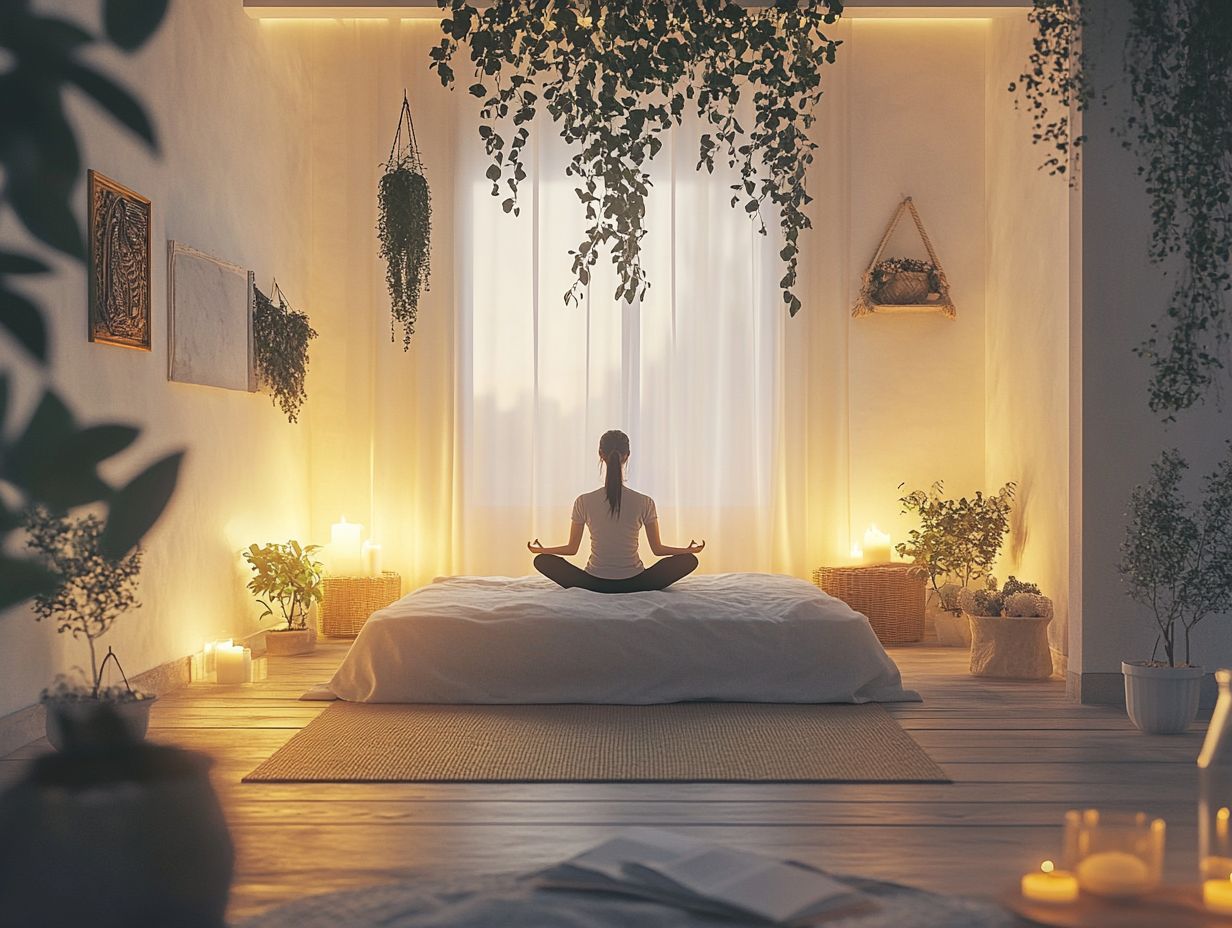
Incorporating mind-body techniques into your nightly routine can promote relaxation and improve sleep quality. Practices like deep breathing, guided imagery, and yoga can reduce stress and anxiety, helping you sleep better naturally.
1. Progressive Muscle Relaxation
Progressive Muscle Relaxation (PMR) enhances sleep quality by tensing and relaxing different muscle groups. This technique counters stress and anxiety, paving the way for a restful night.
Unlike other relaxation methods, PMR adds a physical dimension to your stress response. By tightening and releasing muscle tension, you foster calmness, reduce sleep disturbances, and prepare for deep sleep.
Incorporating PMR into your routine can lower cortisol levels and promote a balanced state, leading to better overall health and restful nights.
2. Deep Breathing Exercises
Deep breathing exercises, like the 4-7-8 technique, help alleviate stress and promote relaxation. They enhance sleep quality through deliberate breath control.
These techniques fit easily into your day and require no special equipment. For diaphragmatic breathing, sit comfortably and place one hand on your chest and the other on your abdomen. Inhale through your nose for four seconds, letting your abdomen rise, then exhale through your mouth for six seconds. This calms your mind and boosts oxygen flow for mental clarity.
The 4-7-8 technique involves inhaling for four seconds, holding for seven, and exhaling completely for eight seconds. This pattern helps slow your heart rate and induces calm, making it beneficial for those with sleep issues.
Incorporating these practices into your evening routine can reduce anxiety and enhance sleep quality, improving your overall well-being.
3. Guided Imagery
Guided imagery is a visualization exercise that takes your mind to calming places, reducing stress and fostering deeper sleep. It helps create a peaceful mental state, supporting healthy sleep habits.
During guided imagery, you can visualize serene scenes like a sunlit beach. To practice, find a quiet space, close your eyes, and take deep breaths. Focus on sensory details, such as the sound of waves or the scent of pine, to enhance the experience.
This technique not only alleviates anxiety but also improves sleep quality. Research shows mental imagery can lower heart rates and promote relaxation.
For example, picturing yourself floating on a gentle river can bring tranquility, leading to a restful night.
4. Mindful Meditation
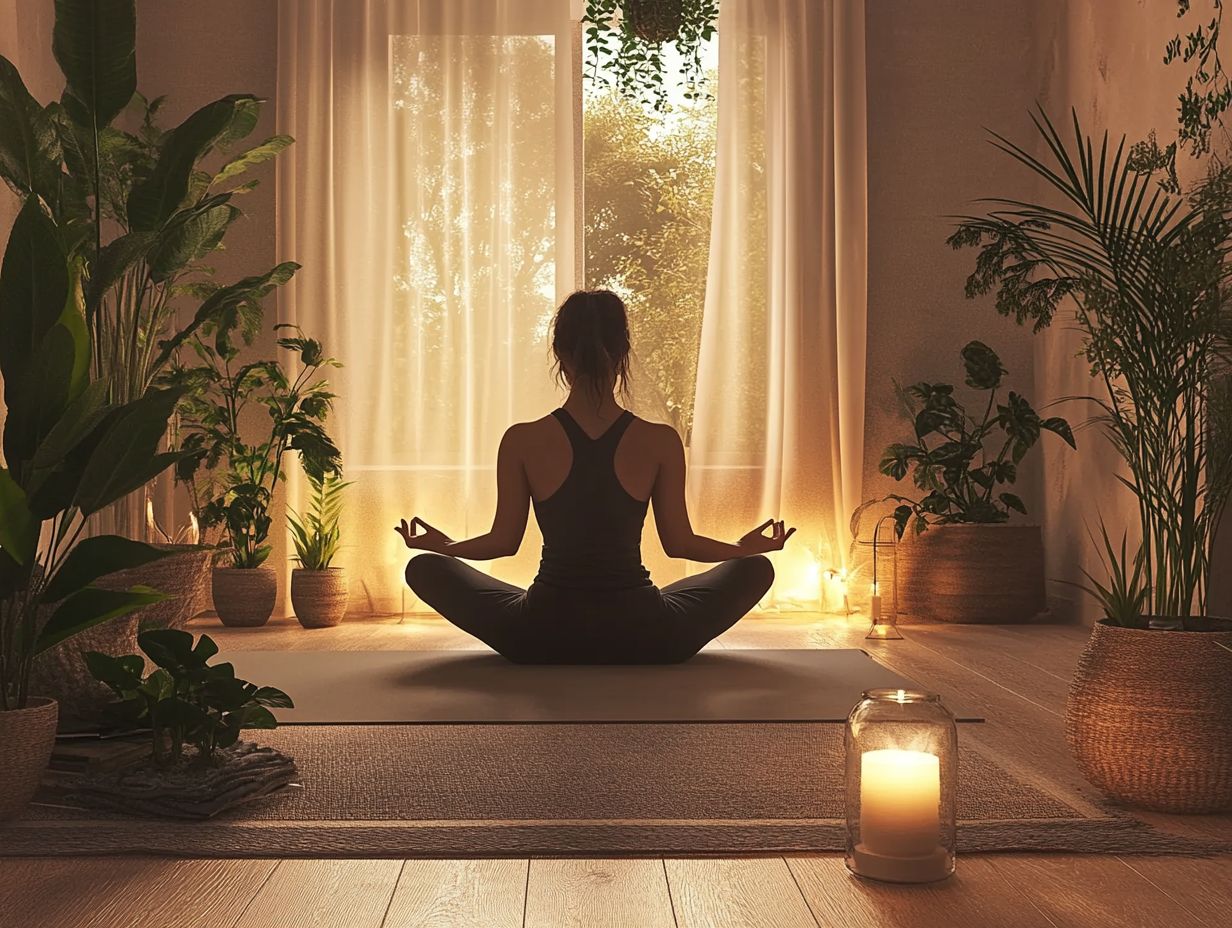
Mindful meditation is a helpful practice that nurtures your mental well-being by fostering present-moment awareness. This approach reduces stress and promotes your body s natural way to relax, leading to improved sleep quality and overall health.
As you begin to embrace this technique, you may find it particularly effective in combating insomnia. It lays the groundwork for healthier sleeping patterns. By cultivating a deeper connection to your thoughts and feelings, mindful meditation helps you identify the sources of your sleep disturbances. This is crucial in alleviating the anxiety that often disrupts your rest.
Incorporating simple techniques such as breathing exercises, body scans, or guided imagery into your nighttime routine can seamlessly integrate meditation into your life. This makes it easier for you to transition into a restful slumber each evening.
Try these mindful meditation techniques tonight and see how they improve your sleep!
5. Yoga para un Mejor Sue o
Yoga, especialmente pr cticas como el Yoga Nidra, proporciona una combinaci n distintiva de movimiento f sico y t cnicas de relajaci n. Estas pueden mejorar significativamente tu higiene del sue o.
Al calmar tu sistema nervioso y reducir los niveles de estr s, allanar s el camino para un sue o m s profundo y reparador.
Incluir posturas suaves como la Postura del Ni o, las Piernas en la Pared, y la Flexi n hacia Adelante Sentado puede amplificar enormemente tu respuesta de relajaci n. Esto infunde una sensaci n de tranquilidad a medida que se acerca la hora de dormir.
Estas rutinas no solo estiran tu cuerpo, sino que tambi n silencian tu mente, facilitando que entres en un estado de descanso.
Establecer un ritual nocturno que incorpore yoga fomenta la consistencia y se ala a tu cuerpo que es hora de relajarse. Para aquellos que reci n comienzan, dedicar solo unos minutos cada noche puede ayudarte a desarrollar un h bito sostenible que mejore tu calidad de sue o y bienestar general.
Start incorporating these techniques today for a quick boost in your well-being!
How Do Mind-Body Techniques Help with Sleep?
Mind-body techniques like meditation, deep breathing, and progressive muscle relaxation are essential for enhancing your sleep quality. They help you manage insomnia and reduce stress, making them effective when combined with energy healing for insomnia to promote overall mental well-being through intentional relaxation methods.
These practices activate your body s relaxation response, effectively countering the stress response that often disrupts sleep. Research shows that mindfulness meditation can significantly lower cortisol levels the stress hormone putting you in a calmer state that s more conducive to sleep.
A study published in the Journal of Clinical Psychology revealed that participants who practiced progressive muscle relaxation experienced improved sleep quality and reduced insomnia symptoms in just a few weeks.
In everyday life, individuals have successfully woven these techniques into their nightly routines. Just 10 minutes of deep breathing before bed can transform your environment into a more tranquil space. This makes it easier for you to drift off and stay asleep through the night.
What Are the Benefits of Using Mind-Body Techniques for Sleep?
The benefits of employing mind-body techniques for sleep are truly remarkable. They encompass enhanced sleep quality, alleviation of insomnia symptoms, improved anxiety management, and the establishment of a soothing relaxation response that fosters restful slumber.
By integrating practices such as mindfulness meditation, gentle yoga, or deep breathing exercises into your bedtime routine, you can significantly reduce anxiety levels. For example, when you practice deep breathing before bed, feel your heart rate slow down and the tension in your muscles ease, paving the way for more tranquil nights.
This calming effect not only promotes better sleep hygiene but also enhances cognitive function and emotional resilience during your waking hours.
Over time, incorporating these techniques can lead to a holistic improvement in your overall well-being. You can wake up feeling refreshed and ready to tackle the day ahead.
Don t wait! Start your journey to better sleep today with these mind-body techniques!
When Is the Best Time to Practice Mind-Body Techniques for Sleep?
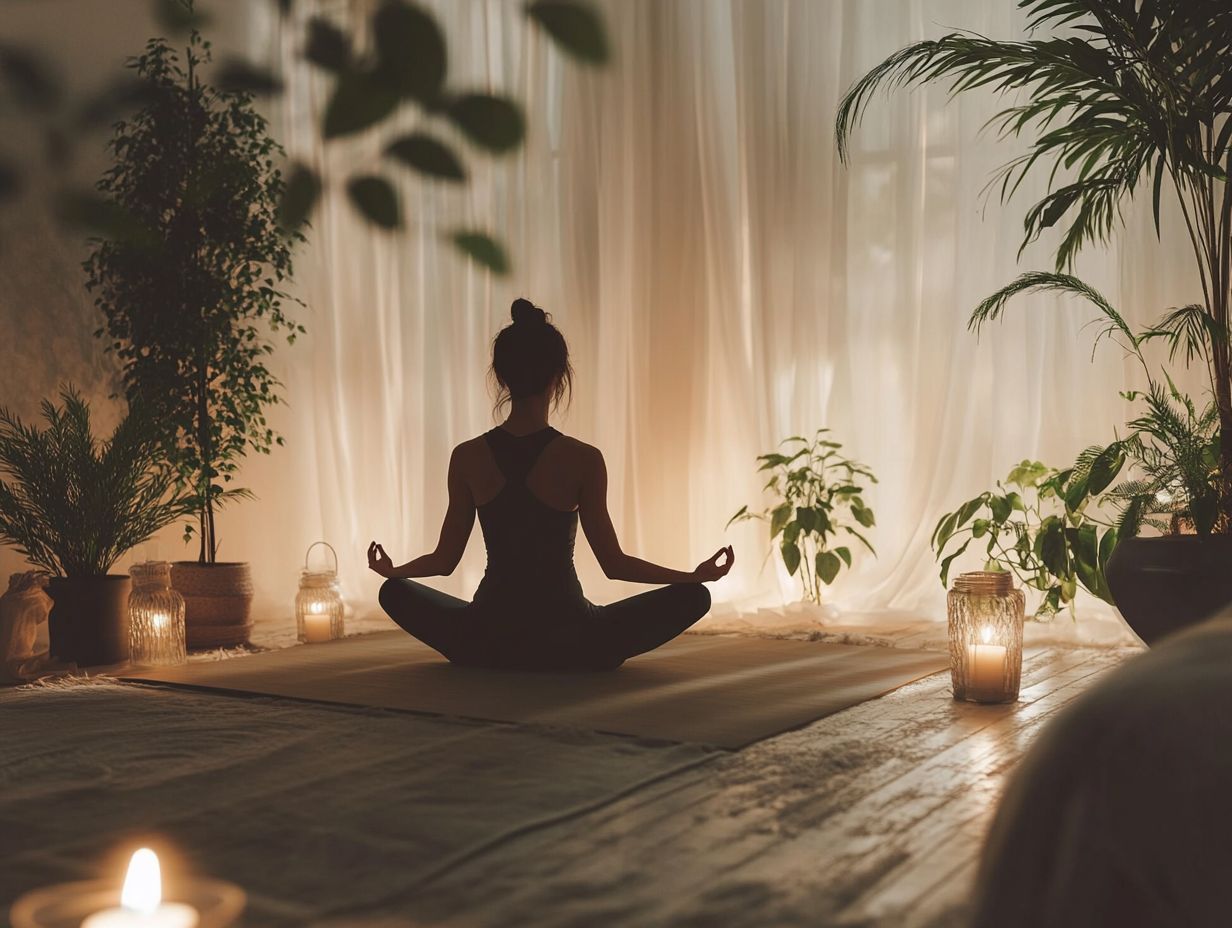
Practicing mind-body techniques in the evening, ideally as part of a consistent nighttime routine, can significantly improve your sleep by preparing both your body and mind for rest. Additionally, exploring energy healing techniques for stress relief can help you enjoy deeper, more refreshing sleep!
Integrating practices such as gentle yoga, meditation, or deep-breathing exercises can truly make a big difference. Picture this: a calming 15-minute yoga session in a softly lit space helps you release the tensions of the day. A brief period of guided meditation fosters mindfulness and promotes emotional balance.
To make the most of these activities, aim to start them at least an hour before bed for a seamless transition into slumber. Creating a serene environment with soothing scents or calming music can enhance the effectiveness of these techniques, making them more enjoyable to weave into your nightly habit.
How Can One Incorporate Mind-Body Techniques into Their Nightly Routine?
Incorporating mind-body techniques into your nightly routine is easy with a few simple adjustments. Designate a specific time for practices like deep breathing or yoga nidra yoga nidra is a type of guided meditation that relaxes your body while keeping your mind awake. Create a comfortable environment, and consider pairing these techniques with calming bedtime snacks.
Crafting an inviting atmosphere can enhance your experience. Imagine dimming the lights and using soft, soothing colors in your space to promote relaxation. A warm, scented candle or an essential oil diffuser with lavender or chamomile beautifully sets the mood.
Prepare a cozy nook with plush cushions or a soft blanket to make your practice even more inviting. Snack options like chamomile tea with a few almonds or slices of banana can offer nutritional benefits while aiding your relaxation.
These thoughtful combinations can transform your transition into a restful night s sleep, making it enjoyable and effective.
Are There Any Precautions to Consider When Using Mind-Body Techniques for Sleep?
When looking to improve your sleep with mind-body techniques, it s crucial to consider a few precautions. If you re dealing with severe insomnia or health issues, consulting a healthcare provider is a wise step to ensure the methods you choose are safe and tailored to your needs.
Personalization is key; not every technique will resonate with everyone. As a beginner, it s best to ease into gentle practices like deep breathing or guided imagery. This way, your body can adapt without feeling overwhelmed.
Pay close attention to how each method affects your sleep. Jot down notes to pinpoint what feels beneficial or might be triggering.
Seeking professional guidance can enhance your experience, ensuring that the techniques you select harmonize with your health conditions and lifestyle, ultimately paving the way for more restful nights.
What Are Some Other Tips for Improving Sleep Quality?
To improve your sleep, consider incorporating additional strategies such as maintaining a consistent sleep schedule, optimizing your bedroom for comfort, and practicing relaxation techniques. This well-rounded approach can help you get better sleep.
Regular exercise can improve your sleep. Exercise helps regulate sleep hormones and alleviates stress. You can also use aromatherapy; essential oils like lavender or chamomile before bedtime create a soothing atmosphere, making it easier for you to drift off.
Managing your stress responses through mindfulness or meditation is equally important. Even brief moments of focused breathing can reduce anxiety levels and foster relaxation. By weaving these habits into your routine, you can cultivate a serene bedtime ritual that not only improves your sleep hygiene but also offers long-term benefits for your overall well-being.
Frequently Asked Questions
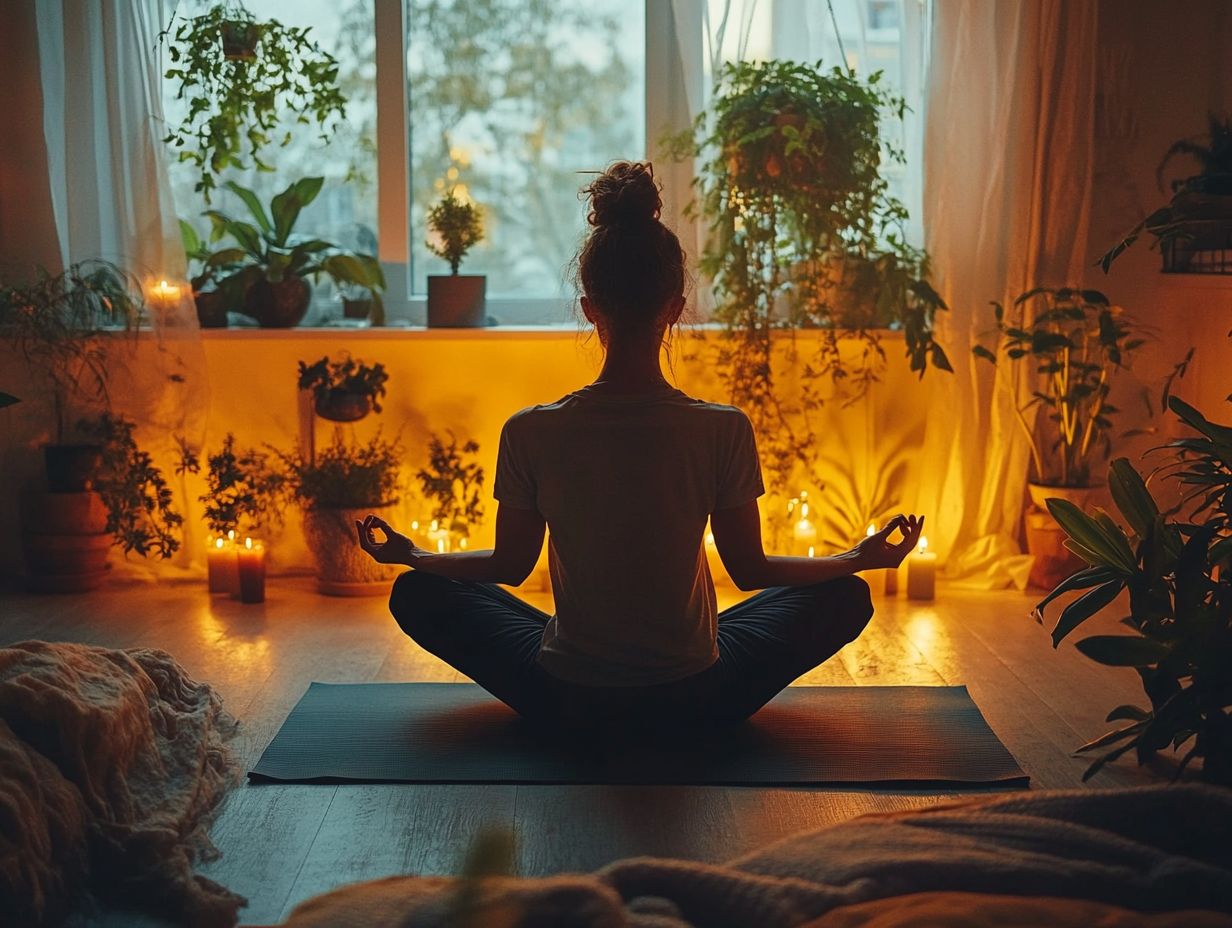
What are the 5 effective mind-body techniques for better sleep?
- Deep breathing
- Progressive muscle relaxation
- Guided imagery
- Mindfulness meditation
- Yoga
How can deep breathing help improve sleep?
Deep breathing helps relax the body and mind, reducing stress and promoting better sleep.
It also regulates breath and oxygen flow, improving overall relaxation and sleep quality.
What is progressive muscle relaxation?
Progressive muscle relaxation is a method where you tense and relax specific muscle groups in your body.
This practice promotes deep relaxation and reduces tension, making it easier to unwind and sleep.
Can guided imagery help with sleep?
Yes! Guided imagery uses mental images to foster relaxation and ease stress.
This approach redirects your thoughts away from worries, helping you drift off to sleep.
How does mindfulness meditation contribute to better sleep?
Mindfulness meditation focuses on the present moment, encouraging awareness of your thoughts and feelings without judgment.
This calming practice makes it easier to fall asleep and stay asleep.
Why is yoga beneficial for improving sleep?
Yoga combines physical movement, deep breathing, and mindfulness, making it a powerful tool for relaxation.
Regular yoga practice can enhance sleep quality and reduce disturbances.



